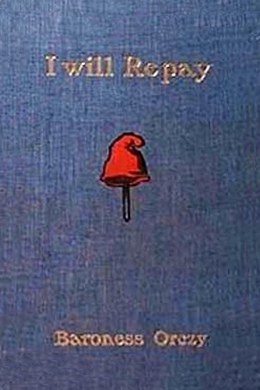
I Will Repay
by Emma Orczy
subjects: Action & Adventure, Historical Fiction
series: The Pimpernel (#6)
-
EPUB 287 KB
-
Kindle 339 KB
-
Support epubBooks by making a small $2.99 PayPal donation purchase.
Description
It’s 1783 and wealthy Paul Déroulède has offended the young Vicomte de Marny by speaking disrepctfully of his latest infatuation, Adèle de Monterchéri. Déroulède had not intended to get into the quarrel but has a tendency to blunder into things – “no doubt a part of the inheritance bequeathed to him by his bourgeois ancestry.” Incensed at the slur on Adèle, who he sees as a paragon of virtue, the Vicomte challenges Déroulède to a duel, a fight which Déroulède does not want – for he knows and respects the boy’s father, the Duc de Marny.
254 pages with a reading time of ~4 hours (63639 words), and first published in 1906. This DRM-Free edition published by epubBooks, 2015.
Community Reviews
There are currently no other reviews for this book.
Excerpt
The outrage.
It would have been very difficult to say why Citizen Déroulède was quite so popular as he was. Still more difficult would it have been to state the reason why he remained immune from the prosecutions, which were being conducted at the rate of several scores a day, now against the moderate Gironde, anon against the fanatic Mountain, until the whole of France was transformed into one gigantic prison, that daily fed the guillotine.
But Déroulède remained unscathed. Even Merlin’s law of the suspect had so far failed to touch him. And when, last July, the murder of Marat brought an entire holocaust of victims to the guillotine–from Adam Lux, who would have put up a statue in honour of Charlotte Corday, with the inscription: “Greater than Brutus”, to Charlier, who would have had her publicly tortured and burned at the stake for her crime–Déroulède alone said nothing, and was allowed to remain silent.
The most seething time of that seething revolution. No one knew in the morning if his head would still be on his own shoulders in the evening, or if it would be held up by Citizen Samson the headsman, for the sansculottes of Paris to see.
Yet Déroulède was allowed to go his own way. Marat once said of him: “Il n’est pas dangereux.” The phrase had been taken up. Within the precincts of the National Convention, Marat was still looked upon as the great protagonist of Liberty, a martyr to his own convictions carried to the extreme, to squalor and dirt, to the downward levelling of man to what is the lowest type in humanity. And his sayings were still treasured up: even the Girondins did not dare to attack his memory. Dead Marat was more powerful than his living presentment had been.
And he had said that Déroulède was not dangerous. Not dangerous to Republicanism, to liberty, to that downward, levelling process, the tearing down of old traditions, and the annihilation of past pretensions.
Déroulède had once been very rich. He had had sufficient prudence to give away in good time that which, undoubtedly, would have been taken away from him later on.
But when he gave willingly, at a time when France needed it most, and before she had learned how to help herself to what she wanted.
And somehow, in this instance, France had not forgotten: an invisible fortress seemed to surround Citizen Déroulède and keep his enemies at bay. They were few, but they existed. The National Convention trusted him. “He was not dangerous” to them. The people looked upon him as one of themselves, who gave whilst he had something to give. Who can gauge that most elusive of all things: Popularity?
He lived a quiet life, and had never yielded to the omni-prevalent temptation of writing pamphlets, but lived alone with his mother and Anne Mie, the little orphaned cousin whom old Madame Déroulède had taken care of, ever since the child could toddle.
Everyone knew his house in the Rue Ecole de Médecine, not far from the one wherein Marat lived and died, the only solid, stone house in the midst of a row of hovels, evil-smelling and squalid.
The street was narrow then, as it is now, and whilst Paris was cutting off the heads of her children for the sake of Liberty and Fraternity, she had no time to bother about cleanliness and sanitation.
Rue Ecole de Médecine did little credit to the school after which it was named, and it was a most unattractive crowd that usually thronged its uneven, muddy pavements.
A neat gown, a clean kerchief, were quite an unusual sight down this way, for Anne Mie seldom went out, and old Madame Déroulède hardly ever left her room. A good deal of brandy was being drunk at the two drinking bars, one at each end of the long, narrow street, and by five o’clock in the afternoon it was undoubtedly best for women to remain indoors.
The crowd of dishevelled elderly Amazons who stood gossiping at the street corner could hardly be called women now. A ragged petticoat, a greasy red kerchief round the head, a tattered, stained shift–to this pass of squalor and shame had Liberty brought the daughters of France.
And they jeered at any passer-by less filthy, less degraded than themselves.
“Ah! voyons l’aristo!” they shouted every time a man in decent clothes, a woman with tidy cap and apron, passed swiftly down the street.
And the afternoons were very lively. There was always plenty to see: first and foremost, the long procession of tumbrils, winding its way from the prisons to the Place de la Révolution. The forty-four thousand sections of the Committee of Public Safety sent their quota, each in their turn, to the guillotine.
